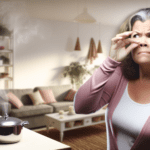Menopause, a natural biological process that marks the end of a woman’s reproductive years, brings about a myriad of changes in the body due to fluctuating hormone levels. One area that is often overlooked is the potential impact of menopause on auditory health. During this transition, many women may experience changes in their hearing abilities. The decline in estrogen and progesterone levels can affect the ears’ mucus membranes, potentially leading to dryness and a host of auditory issues such as tinnitus, hearing loss, and a heightened sensitivity to sound.
Defining hearing problems and their prevalence
Hearing problems can range from mild difficulty in understanding conversations, especially in noisy environments, to a more severe hearing impairment known as presbycusis, or age-related hearing loss. These issues are not uncommon; in fact, hearing loss is estimated to affect approximately 48 million Americans, with a global prevalence expected to rise as the population ages. In the context of menopause, studies have suggested that reduced estrogen levels after menopause may be associated with hearing loss in women, although the exact relationship remains complex and not fully understood.
The importance of addressing hearing issues
Addressing hearing problems is crucial, not only for maintaining social connections and overall quality of life but also because untreated hearing loss has been linked to other health concerns, including cognitive decline and depression. With the potential for menopause to exacerbate or trigger hearing issues, it is vital for women to monitor their auditory health during this time. Understanding the signs of hearing loss and seeking timely medical advice can lead to early intervention and better management of these problems.
Understanding Hearing Problems
Hearing problems can manifest in various forms, each with its own set of challenges and implications for individuals experiencing them. The most common types include:
- Conductive hearing loss: Occurs when sound is not efficiently conducted through the outer ear canal to the eardrum and the tiny bones of the middle ear. This type can often be medically or surgically corrected.
- Sensorineural hearing loss: Results from damage to the inner ear or the nerve pathways from the inner ear to the brain. It is typically permanent and can be managed with hearing aids or cochlear implants.
- Mixed hearing loss: A combination of conductive and sensorineural hearing loss, indicating damage in both the outer or middle ear and the inner ear.
Common Causes of Hearing Loss
Hearing loss can be attributed to a variety of factors, including:
- Age-related changes: Known as presbycusis, this is a gradual loss of hearing that occurs as individuals grow older.
- Noise exposure: Prolonged exposure to loud noises can damage the hair cells in the cochlea, leading to noise-induced hearing loss.
- Genetic predisposition: Hearing loss can be inherited from one’s parents, contributing to susceptibility.
- Illnesses and infections: Certain diseases and infections can impact hearing, such as meningitis, measles, and mumps.
- Medications: Ototoxic drugs can damage the inner ear, sometimes resulting in temporary or permanent hearing loss.
- Physical trauma: Injuries to the head or ear can cause hearing impairment.
The Role of Estrogen in Auditory Health
Estrogen, a hormone that plays a crucial role in the reproductive system, also impacts auditory health. Estrogen receptors are present in various parts of the ear, suggesting that estrogen may influence hearing. Studies have indicated that low estrogen levels can impair hearing, potentially through alterations in cochlear blood flow, neuroregulatory mechanisms, or bone metabolism in the otic capsule. During menopause, the reduction in estrogen levels may be associated with an increased risk of hearing loss in women.
Furthermore, estrogen’s role in maintaining blood flow and protecting hair cells in the inner ear is significant. As women transition into menopause and their estrogen levels decline, they may experience a corresponding decrease in auditory function. This highlights the importance of monitoring hearing health, particularly during the menopausal transition, and considering the potential benefits of hormone replacement therapy (HRT) as a means to mitigate the risk of hearing loss.
Menopause and Its Impact on Hearing
Menopause marks the end of a woman’s reproductive years, accompanied by a decline in the production of estrogen and progesterone. These hormonal changes can have a significant impact on various bodily functions, including hearing. Estrogen, in particular, plays a crucial role in maintaining the health of the cochlea—the auditory portion of the inner ear. It supports the cochlear blood flow and protects the sensory hair cells responsible for converting sound waves into electrical signals. As estrogen levels drop during menopause, women may experience changes in cochlear blood flow and increased vulnerability of the hair cells, potentially leading to hearing loss.
Estrogen Receptors in Ear Cells
Estrogen receptors are found throughout the auditory system, including the inner and outer hair cells, spiral ganglion cells, and stria vascularis. These receptors suggest that estrogen directly influences auditory function. When estrogen binds to these receptors, it can modulate neuroregulatory mechanisms and neuronal physiology, which are essential for normal hearing. The decline in estrogen during menopause may therefore disrupt these processes, contributing to hearing problems.
Progesterone and Its Influence on Hearing
Progesterone is another hormone that decreases during menopause and may affect hearing. Although progesterone receptors are not typically found in the cochlea, this hormone could indirectly influence hearing by interacting with other receptors or affecting cochlear blood flow. The exact mechanisms by which progesterone impacts hearing are less understood than those of estrogen, but it is clear that the hormonal milieu of menopause can alter auditory health.
Studies Linking Menopause to Hearing Loss
Several studies have investigated the relationship between menopause and hearing loss. Cross-sectional studies have reported poorer hearing in postmenopausal women compared to premenopausal women, although these studies often did not adjust for age, a significant confounder. However, studies that have accounted for age suggest that reduced estrogen levels after menopause may be associated with hearing loss. Furthermore, postmenopausal women with higher serum estradiol levels have shown a lower prevalence of hearing loss. The use of hormone therapy (HT) has also been studied, with mixed results. Some research indicates that postmenopausal women who do not take HT have poorer hearing thresholds than those who use HT. However, the relationship between HT and the risk of hearing loss has not been thoroughly examined in a prospective manner.
In conclusion, menopause can have a profound impact on hearing, with hormonal changes playing a significant role. The presence of estrogen receptors in ear cells and the potential influence of progesterone on hearing further underscore the complexity of this relationship. Ongoing research continues to clarify the links between menopause and hearing loss, providing valuable insights for women navigating this stage of life.
Lifestyle and Dietary Factors Affecting Hearing
The foods we consume can have a significant impact on our hearing health. Nutrients such as folate, magnesium, omega-3 fatty acids, potassium, and vitamins C and E have been associated with a reduced risk of hearing loss. These nutrients aid in maintaining good blood circulation, which is crucial for the delicate structures within the ear. Conversely, diets high in sugar and fat may contribute to poor circulation and, consequently, negatively affect hearing. It is essential to include a variety of fruits, vegetables, whole grains, and lean proteins in one’s diet to support auditory health.
Medications and Their Association with Hearing Loss
Some medications, known as ototoxic drugs, can damage the inner ear, leading to hearing loss or tinnitus. These include certain antibiotics, chemotherapy drugs, loop diuretics, and nonsteroidal anti-inflammatory drugs (NSAIDs) like ibuprofen and acetaminophen. It is crucial for individuals, especially those undergoing menopause, to discuss the potential auditory side effects of any medication with their healthcare provider. Adjusting dosages or finding alternative treatments may help mitigate the risk of hearing problems.
Environmental Factors and Noise Exposure
Chronic exposure to loud noise is one of the most common causes of hearing loss. This can occur through occupational noise exposure, recreational activities, or even everyday activities such as listening to music at high volumes through headphones. The risk of noise-induced hearing loss can be exacerbated during menopause, as hormonal changes may make the ear more susceptible to damage. To protect hearing, it is advisable to avoid loud noises when possible, use hearing protection like earplugs or earmuffs in noisy environments, and follow the 60/60 rule when using headphones—listening at no more than 60% volume for no more than 60 minutes at a time.
In conclusion, lifestyle and dietary choices play a pivotal role in maintaining hearing health, particularly during menopause. A balanced diet rich in essential nutrients, cautious use of medications, and diligent protection against noise exposure can all contribute to preserving hearing function during this stage of life.
Natural Management of Hearing Problems
Maintaining a healthy lifestyle is crucial for preventing many health issues, including hearing problems. Here are some lifestyle choices that can help preserve your hearing:
- Regular Exercise: Physical activity can improve blood flow, which is beneficial for the health of the inner ear.
- Healthy Diet: A diet rich in antioxidants and important nutrients can protect against oxidative stress that may damage hearing.
- Avoid Loud Noises: Protect your ears from loud noises by using earplugs or earmuffs in noisy environments.
- Regular Hearing Check-ups: Early detection of hearing issues is key. Schedule regular appointments with an audiologist.
- Stress Management: Chronic stress can negatively impact hearing, so practices like meditation, yoga, or deep breathing can be beneficial.
Natural Supplements for Hearing Health
Certain vitamins and minerals are known to support auditory health. Here are some supplements that may help:
- Omega-3 Fatty Acids: Found in fish oil, these can help maintain blood flow to the ear.
- Magnesium: This mineral may protect against noise-induced hearing loss.
- Potassium: Helps regulate the fluid in the inner ear which is important for hearing.
- Vitamin B12: Deficiency in this vitamin has been linked to hearing loss.
- Zinc: This can boost the immune system and help with cell growth in the ear.
Before starting any supplement, consult with a healthcare provider to ensure they are appropriate for your individual health needs.
Avoidance of Certain Substances and Habits
Some substances and habits can exacerbate hearing problems. Here are some to avoid:
- Smoking: Smoking can restrict blood flow to the ear, leading to damage.
- Excessive Alcohol: Overconsumption can lead to auditory damage.
- Certain Medications: Some medications are ototoxic and can affect hearing. Always discuss potential side effects with your doctor.
- Loud Music: Listening to music at high volumes, especially through headphones, can cause noise-induced hearing loss.
By making informed choices about lifestyle, diet, and environmental factors, you can take significant steps toward preserving your hearing health naturally.

Popular Read
When to Seek Medical Advice
Menopause can be accompanied by various health changes, including alterations in hearing. It is essential to be vigilant about the signs that may indicate the need for a medical consultation. Some of these signs include:
- A noticeable decline in the ability to hear, especially high-pitched sounds or conversations in noisy environments.
- The onset of tinnitus, characterized by ringing, buzzing, or other persistent noises in the ears.
- Difficulty in understanding speech, asking others to repeat themselves frequently, or the need to increase the volume on electronic devices.
- Experiencing dizziness or balance issues, which could be related to changes in the inner ear.
- A family history of hearing loss, which could suggest a genetic predisposition.
If you encounter any of these symptoms, it is crucial to consult with a healthcare professional to determine the cause and appropriate treatment.
Health conditions related to hearing problems in menopause
During menopause, the decrease in estrogen and progesterone levels can impact various bodily functions, including auditory health. Conditions that may be related to hearing problems during this phase include:
- Otosclerosis: A condition that can cause conductive hearing loss due to abnormal bone growth in the middle ear.
- Meniere’s disease: An inner ear disorder that can lead to hearing loss and vertigo.
- Acoustic neuroma: A benign tumor on the nerve that connects the ear to the brain, potentially affecting hearing and balance.
Additionally, other health issues such as cardiovascular disease, diabetes, and thyroid disorders can also influence hearing during menopause. It is important to address these conditions promptly with a healthcare provider.
The role of an audiologist in managing hearing issues
An audiologist is a healthcare professional specializing in diagnosing, managing, and treating hearing and balance disorders. When experiencing hearing problems during menopause, an audiologist can:
- Conduct comprehensive hearing evaluations to assess the type and degree of hearing loss.
- Recommend and fit hearing aids or other assistive listening devices to improve hearing function.
- Provide counseling and rehabilitation services to help individuals adapt to hearing loss and optimize communication.
- Offer strategies for managing tinnitus and related symptoms.
- Work in conjunction with other healthcare providers to address any underlying medical conditions that may affect hearing.
Seeking the expertise of an audiologist can lead to a better understanding of your hearing health and the development of a personalized management plan. Early intervention is key to preventing further hearing deterioration and maintaining quality of life during and after the menopausal transition.

Conclusion
Throughout this article, we have explored the intricate relationship between menopause and hearing problems. It is evident that menopause, a natural phase in a woman’s life characterized by the cessation of menstrual periods and a decline in the production of hormones such as estrogen and progesterone, can have a significant impact on auditory health. Studies have highlighted that lower estrogen levels, which are a hallmark of menopause, may impair hearing through various mechanisms, including alterations in cochlear blood flow and neuroregulatory functions. Additionally, the use of hormone therapy (HT), particularly oral HT, has been associated with an increased risk of hearing loss, with the risk escalating with the duration of HT use.
Final Thoughts on Monitoring and Managing Hearing Health
Given the potential for menopause and HT to affect hearing, it is crucial for women to be vigilant about their auditory health during this stage of life. Monitoring hearing is essential, and women should consider regular hearing evaluations, especially if they are experiencing symptoms such as tinnitus or difficulty in understanding speech. Lifestyle and dietary choices also play a role in maintaining hearing health; a diet resembling the Mediterranean or DASH patterns, for instance, has been associated with a lower risk of hearing loss.
Women considering HT should discuss the potential auditory risks with their healthcare providers and weigh these against the benefits. If HT is initiated, it should be closely monitored, and its use should be limited to the necessary duration. Additionally, being aware of medications that may impact hearing, such as ibuprofen and acetaminophen, is important. Regular health checkups can help identify other conditions that may contribute to hearing loss.
In conclusion, while menopause and HT can pose challenges to hearing health, awareness and proactive management can help mitigate these risks. By making informed decisions, monitoring health, and adopting a healthy lifestyle, women can better navigate the changes that come with menopause while preserving their hearing.









